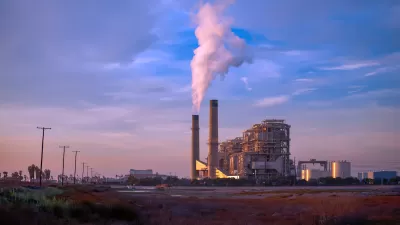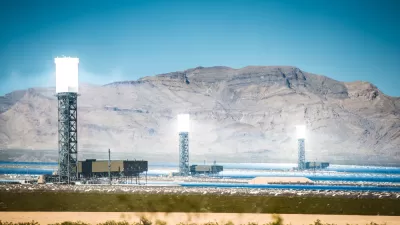The consequences of this ruling have long been foretold. With the U.S. Environmental Protection Agency now officially barred from the fight against climate change, Congress will have to act to reduce carbon emissions.

“The Supreme Court limited the Environmental Protection Agency’s ability to regulate carbon dioxide emissions from power plants in a 6-3 ruling handed down Tuesday that will have far-reaching implications on the federal government’s ability to fight climate change,” reports Ben Adler for Yahoo News.
The case, West Virginia v. EPA, asked the Supreme Court to consider whether the U.S. EPA under the Trump administration violated the Clean Air Act by weakening planned limits on carbon emissions from power plants. The decision, according to Adler, “[signals] to future administrations that the pollution causing climate change can go effectively unregulated, and leaving the job of passing binding emissions restrictions to Congress.”
“The court further agreed with a collection of Republican-led states and coal industry groups that the EPA, because its head is a political appointee, cannot accelerate the power sector’s transition from fossil fuels to clean energy because that goes beyond the powers granted to the EPA under the Clean Air Act,” adds Adler.
The Clean Power Plan, released in 2015 by the U.S. EPA under the Obama administration, was considered the nation’s most significant emissions reduction effort, but the Clean Power Plan never took effect, after the U.S. Supreme Court suspended the plan in February 2016 after a bipartisan coalition of 24 states sued the Environmental Protection Agency in October 2015. The Trump administration replaced the rule in 2019 with the “Affordable Clean Energy Plan.”
Enter the legal battle that preceded today’s ruling. Adler explains:
Petitioners such as the American Lung Association sued to get the rule reinstated, arguing that the Clean Power Plan was legally valid and the Trump-era replacement known as the Affordable Clean Energy (ACE) rule, which did not require anything except modest gains in efficiency from coal-fired plants, was too weak to meet the EPA’s legal obligation to regulate carbon dioxide. (In 2007, the Supreme Court ruled 5-4 in Massachusetts v. EPA that the EPA is required to regulate carbon dioxide because it causes climate change, and the Clean Air Act mandates that the agency regulate “any air pollutant” that can “reasonably be anticipated to endanger public health or welfare.”)
Eventually, West Virginia challenged that ruling, leading to the decision announced today.
FULL STORY: Supreme Court invalidates 'important tool' to regulate climate pollution

Trump Administration Could Effectively End Housing Voucher Program
Federal officials are eyeing major cuts to the Section 8 program that helps millions of low-income households pay rent.

Planetizen Federal Action Tracker
A weekly monitor of how Trump’s orders and actions are impacting planners and planning in America.

Ken Jennings Launches Transit Web Series
The Jeopardy champ wants you to ride public transit.

‘Smart Surfaces’ Policy Guide Offers Advice for Building and Maintaining Urban Tree Canopies
Healthy, robust tree canopies can reduce the impacts of extreme heat and improve air quality.

New Jersey Lawsuit Targets Rent-Setting Algorithms
The state of New Jersey is taking legal action against landlords and companies that engage in what the state’s Attorney General alleges is illegal rent fixing.

Washington Legislature Passes Rent Increase Cap
A bill that caps rent increases at 7 percent plus inflation is headed to the governor’s desk.
Urban Design for Planners 1: Software Tools
This six-course series explores essential urban design concepts using open source software and equips planners with the tools they need to participate fully in the urban design process.
Planning for Universal Design
Learn the tools for implementing Universal Design in planning regulations.
Heyer Gruel & Associates PA
Ada County Highway District
Institute for Housing and Urban Development Studies (IHS)
City of Grandview
Harvard GSD Executive Education
Toledo-Lucas County Plan Commissions
Salt Lake City
NYU Wagner Graduate School of Public Service





























